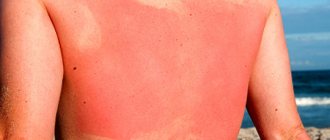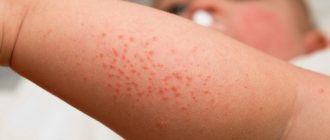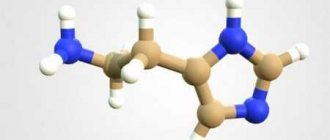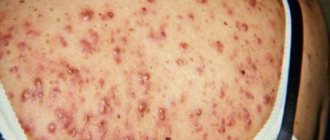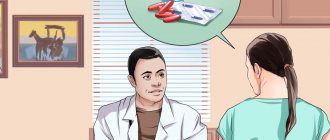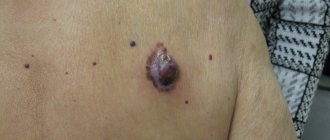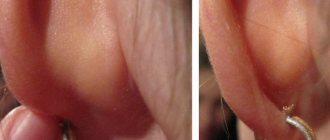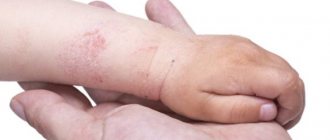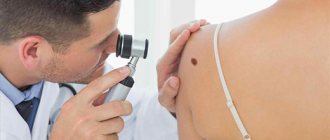Treatment methods
Allergy treatment must be prescribed by a qualified allergist and be comprehensive. Symptomatic therapy is carried out using medications:
- Antihistamines (Suprastin, Tavegil, Citrine, etc.) eliminate itching and rash. The choice of remedy is determined by the doctor individually for each patient. For mild forms, a tablet form is prescribed; for large areas of the rash, a course of injections is used.
- For local effects on skin lesions, creams and ointments (Solcoseryl, Gistan, etc.) are prescribed.
- To cleanse the body, it is effective to use entrosorbents to remove excess histamine and its consequences from the blood (Polysorb, Enterosgel, Activated carbon, etc.).
- It is not advisable to treat manifestations of rhinitis with vasoconstrictor drops; the safest way to eliminate this symptom is to irrigate the nasal mucosa with isotonic solutions.
- A coughing attack due to nerves cannot be relieved by antitussives; it is enough to humidify the air in the room where the patient is, or use inhalation with saline using a nebulizer.
- Sedatives will help normalize the nervous system and eliminate symptoms (Novopassit, Tenoten, etc.).
- It would be a good idea to drink products that improve intestinal microflora (Linex, Normobakt, Maxilak, etc.). This measure will help boost immunity and cope with allergies.
Treatment of allergies with a nervous background is aimed at eliminating nervous tension and includes a number of medical procedures and the support of a psychologist. Often, a person susceptible to depression cannot get out of this state on his own. An experienced doctor engages in therapeutic sessions with such patients for a long time. In severe cases, the doctor conducts hypnosis and self-hypnosis sessions.
Acupuncture, relaxing massage, and exercise in the pool serve as a good addition in the fight for good health, while simultaneously strengthening the patient’s immune properties. Yoga classes not only strengthen physically, but also teach relaxation and meditation, calming the psyche and putting “thoughts in order.”
Signs of illness
As noted above, urticaria from nerves occurs mainly against the background of diseases of the gastrointestinal tract, nervous and endocrine systems, provoked by prolonged emotional stress. The main symptoms of nervous urticaria are:
- skin rashes in the form of blisters;
- general malaise;
- joint and headache;
- elevated temperature (up to 38-39°C).
It should be noted that the rash lasts for several days, then disappears if the exposure to the sensitizing factor stops. But in the case of enzymopathic urticaria, which occurs against the background of internal diseases and under the influence of nervous stress, the course of the allergic disease is usually chronic.
With this type of urticaria, the disease manifests itself as periodic rashes in the form of red or pink blisters with a matte tint, round or angular in shape, which are located on the chest, limbs, back, mucous membranes and tend to merge. As a rule, blisters disappear quickly enough and then appear on other areas of the skin or mucous membranes.
Rashes can be observed for a long time (up to several years) until the cause of the disease is eliminated. And with frequent exacerbations, panic attacks, blisters can last for several weeks, while their consistency becomes dense, small in size, and brown in color. Patients experience persistent chronic urticaria.
Therapy methods
Treatment of urticaria due to nervousness is complex. Therapy is aimed at eliminating the true cause of the allergy. The scheme is selected jointly by the following specialists:
- allergist;
- dermatologist;
- neurologist;
- psychotherapist.
To relieve allergy symptoms, taking antihistamines is indicated. Names of first-line drugs: Suprastin, Claritin. Since medications often provoke side effects, to minimize the risk of their manifestations, it is recommended to take last-line antihistamines: Zyrtec, Xyzal, Ebastine.
The only indication for their use is individual intolerance to the components. If the rash does not go away, an ointment or cream is included in the regimen: Gistan, Protopic, Fenistil, Nezulin. Rashes that bother the patient for more than 10 days are recommended to be treated with hormonal agents: Lorinden, Elokom, Advantan.
To completely cure skin rashes caused by nerves, you will need the help of a doctor. Since the disease is psychotherapeutic in nature, the patient must learn to manage his emotions. Sessions with a psychotherapist are long-term. They are carried out to eliminate panic, phobia, fear, neurasthenia, shortness of breath. In advanced cases, the psychotherapist prescribes drug therapy.
Additional funds
To calm the nerves, relaxation therapy is prescribed: massage, yoga, reflexology and hirudotherapy. Meditation with yoga will help restore proper breathing. They allow you to concentrate on yourself, developing strength of spirit. With the help of yoga, muscle tissue is toned.
Massage and reflexology directly influence the acupuncture points of the body. Manipulations allow you to relax. The patient gets rid of bad thoughts. To relieve nervousness, a neck and head massage is performed. Hirudotherapy eliminates the disease in a comprehensive manner:
- overvoltage is relieved;
- the main neurological signs of urticaria are eliminated.
Folk recipes
For nervous urticaria, on the recommendation of a doctor, you can use folk remedies from mint, licorice root, hops, marjoram, horseradish. The selection of folk remedies is carried out taking into account the pathogenesis and etiology of the disease. Since the disease is associated with stress, herbal medicine includes drugs that normalize the nervous system.
To calm down, you can drink valerian diluted with water. In a stressful situation, take rosemary and motherwort. The latter remedy simultaneously protects the heart from various unfavorable factors. To relieve itching, use vinegar and take a bath with soda. You can make a compress from cucumber and parsley juice.
The following remedies are also effective for nervous urticaria:
- Knotweed infusion. For 250 ml of water you will need 20 g of herb. The product can be drunk every 2 hours, 1 tbsp. l.
- Infusion of wormwood. For 1 tsp. herbs will require 500 ml of water. After 2 hours, the composition can be taken at a dose of 1 tbsp. l.
Stress prevention is carried out with dill juice. To prepare it, you will need to squeeze out the washed dill. A cotton swab is dipped in the resulting juice, which is then applied to the rash. The product can be replaced with clover juice.
Experts advise drinking chamomile decoction. Green tea with honey calms the nerves and relieves stress. With its help, sleep is normalized. If the disease is accompanied by insomnia, special pillows filled with herbs are used for sleep: string, lavender, motherwort, lemon balm.
Diet
The treatment regimen includes a diet. It is recommended to avoid alcoholic beverages, preservatives, salty foods, baked goods, and flavorings. Such food has a negative effect on the functioning of the liver, intestines and gall bladder, which leads to changes in the condition of the skin.
Diet therapy includes drinking plenty of fluids to remove toxins. It is recommended to eat steamed dietary meat. Other foods that are beneficial for patients:
- porridge;
- fruits;
- vegetables.
When urticaria occurs, special attention is paid to personal hygiene. You need to swim without washcloths and gels
Better take a shower. It is necessary to wear clothes made from natural fabrics. To wash clothes, use simple soap.
Treatment options
Curing nervous urticaria is not as easy as it seems. First of all, you need to remove the cause of stress. For this purpose, sedatives are used. Sedative medications regulate the functioning of the nervous system, reducing excitation processes.
At the same time, it is impossible to cure nervous urticaria with pills alone. Psychotherapy is indicated to help relieve the cause of constant stress and overexertion. Patients are recommended to exercise and find more time for recreation and hobbies. As soon as the nervous system begins to function normally, the skin condition will improve and the hives will disappear.
Antiallergic drugs are used to relieve blisters and relieve itching. Nervous urticaria can go away on its own without the help of medications. But if the symptoms persist, you cannot do without antihistamines: there is a risk of developing more severe allergic reactions. To relieve itching, you can also apply cool (but not ice) compresses and take a cold shower.
Sedative therapy
Related materials
What does the rash look like and how does it differ in different types...
May 14, 2018
Dangerous consequences of allergic urticaria, diagnosis and…
May 11, 2018
Herbal-based medicines work most gently. Calming herbs help, some of the medications include Novo-Passit, Fitosed, Persen Forte, Passiflora. You can brew valerian root and motherwort.
Magnesium also has a sedative effect, the reserves of which are consumed when the nervous system is overworked. Magnesium reduces the excitability of neurons and acts as a sedative. The most effective magnesium preparation is Magne-B6 Antistress. You can drink Omega-3 fatty acids for the same purpose. They not only have a sedative effect, but also help the skin recover faster.
Read: Dermographic urticaria: what is this pathology and is it necessary to use medications
Bromides are widely used: potassium or sodium bromide, which balance the functioning of the nervous system. Nootropic drugs are indicated: Piracetam, Phenibut, Glycine.
A neurologist or psychotherapist will help you choose a course of therapy.
Nervous urticaria often occurs as a symptom of mental illness: OCD, depression, anxiety disorder. Antidepressants, sleeping pills, antipsychotics and daytime tranquilizers are used. Treatment is selected by a psychiatrist based on the patient’s symptoms and complaints.
Antihistamines
The mechanism of action of this group of drugs is to block histamine H1 receptors, which are responsible for the development of an allergic reaction.
Drugs effective against urticaria:
- cetirizine (Cetrin);
- levocetirizine (Aleron);
- fexofenadine (Telfast);
- loratadine (Claritin);
- diphenhydramine (Diphenhydramine).
Antiallergic drugs are divided into three groups: first generation, second and third. 1st generation antihistamines (Diphenhydramine) have a strong but short action (4–8 hours), have a sedative and strong hypnotic effect. They are used to suppress one-time exacerbations of an allergic reaction; with prolonged use, the effectiveness decreases.
2nd generation antihistamines (Cetrin, Claritin) work 24 hours, which allows them to be used once a day. They are not addictive and can be used for a long time. They do not have a hypnotic effect and do not suppress cognitive abilities. Well tolerated with a minimum of side effects.
3rd generation antihistamines (Aleron, Telfast) also work 24 hours and are well tolerated in long courses. They do not affect the speed of reactions and are not addictive. In terms of their effectiveness, 2nd and 3rd generation antihistamines act identically.
You need to select the drug individually. If a certain one is suitable, it is better not to change it and strictly follow the course of treatment.
If the symptoms of urticaria persist for more than 6 weeks and it becomes chronic, you will need to consult with an allergist and draw up an individual treatment plan. As a rule, it lasts for a year.
If nervous urticaria is accompanied by edema, taking a severe form, hormonal therapy with corticosteroids is used: Prednisolone, Metypred.
Read: Solar urticaria, what it is and how to deal with it
Why do spots appear on the body?
Stress produces cortisol, adrenaline and norepinephrine. These hormones stimulate the production and storage of energy. But the longer the energy does not find a way out, the stronger the internal tension. As a result, the body begins to destroy itself. Little by little, all systems fail, including the immune system. And then rashes appear on the skin.
In addition, the cause of the appearance of spots can be diseases of the cardiovascular, endocrine, and digestive systems. The following can also cause redness:
- intoxication;
- hormonal disbalance;
- avitaminosis;
- mechanical and fungal damage;
- parasites;
- chronic diseases in combination with nervous overstrain.
Causes and locations of spots
Defects can occur anywhere: face, neck, arms, legs, back, stomach. The following forms of spots are found:
- small red spots accompanied by itching (urticaria);
- inflammation with scaly spots and growths (eczema);
- red scaly redness on a certain area of the skin (lichen);
- dry growths (psoriasis);
- impaired pigmentation (vitilingo).
It is important! Without treatment, rashes can develop into more serious diseases and become chronic.
Why does urticaria occur due to nervousness?
Nervous urticaria is not a disease of one disease. It occurs under the influence of a number of factors. The main catalyst is increased irritability and excitability of the patient's body. In addition to these two factors, there is a feeling of anxiety and suggestibility. Against their background, uncertainty, fear, and a state of nervousness develop.
Experts identify a number of factors that provoke the development of the disease:
- problems of the gastrointestinal tract and digestive system;
- disorders of the nervous system, irritability, prolonged stress, nervousness;
- problems of the urinary system;
- pathologies of the cardiovascular system.
If in the classic manifestation of urticaria the allergen is a food product, then in nervous urticaria the main catalyst for the disease is nervous strain and stress. This disease more often affects women and children, as well as people prone to strong feelings and unable to cope with their own emotions.
The principle of the appearance of nervous urticaria is based on signals from the nervous system that are released in a state of stress. The signal along the nerve endings is transmitted in a distorted form and is recognized incorrectly by the body. This leads to the expansion of the walls of blood vessels and an increase in their permeability. Endothelial cells swell and form urticaria. The classic urticaria rash appears.
Causes and symptoms
The disease manifests itself on the body in the form of blisters, which change their location over time, that is, they disappear from one place and appear in another. In addition to blisters, symptoms include severe itching and burning.
On nerves, urticaria causes:
- some irritability;
- disruptions in the digestive organs;
- the genitourinary system may demonstrate problems;
- the functioning of the heart and blood vessels often malfunctions;
- chronic depression;
- nervous and mental tension;
- fast fatiguability.
Women and children are most susceptible to the disease, as they are more emotional. If the disease is not treated and the factors that provoke it are not eliminated, it becomes chronic.
Most often, people with problems of the gastrointestinal tract, cardiovascular system and sexual dysfunction are susceptible to the disease.
Fatigue accompanies urticaria
When nervous excitement occurs, commands are sent to the body, which it perceives distortedly, which is why hives appear. The skin is connected to the nervous system and also receives impulses, which it deciphers incorrectly. The vessels will be the first to react, as they tend to expand and the walls become more permeable. The cells that make up the inner layer of blood vessels swell and rashes appear.
Therefore, if you know that you are susceptible to the disease or are at risk, protect yourself from stress and worry. The cells of the central nervous system are destroyed and you will no longer be able to function normally, so take your body seriously.
You are causing irreparable damage to him, because there are situations that are not even worth worrying about. Learn to develop stress resistance in yourself. There are many trainings, programs and private specialists that help in the fight against stress. Treating the symptoms of a disease can be much easier than the disease itself. Since the reason is psychological, it is more difficult to cope with. But once you get rid of it, the disease will not recur.
In addition to rashes, neurological urticaria can be recognized by the following signs:
- pressing pain in the heart;
- trembling in the limbs;
- shortness of breath, anxiety;
- loss of appetite, general weakness;
- tachycardia, joint pain, fever;
- dizziness, nausea, headache.
Dizziness and headache are symptoms of urticaria
Directions of therapy
In many cases, stress-induced urticaria goes away on its own. Especially in the absence of stress factors for a long time.
However, in some cases of nerve hives, treatment is necessary. In general, therapy includes the following areas:
- Maximum protection from stress. The patient needs to be provided with comfort and peace.
- Drug therapy. Includes products for both internal and external use.
- Psychotherapy. It is prescribed in courses and in cases where a possible cause has been identified
.
For example, neurosis
. The patient is also taught how to manage stress in difficult and emotionally intense situations. In more serious cases, a trip to a sanatorium is recommended. - Diet. It will be beneficial even if the urticaria is non-allergic. Foods that have a stimulating effect on the nervous system are excluded from the diet
.
This includes alcohol, caffeine-containing foods and drinks, sweets, and seasonings
.
A vegetable-dairy diet will also be useful
. It is advisable to drink more clean water at room temperature. - Supporting measures. Herbal medicine and folk methods
. You can also wipe the patient's skin with a damp towel from time to time.
Drug therapy usually includes:
- Ointments, creams, gels. Designed to soothe the skin and eliminate the inflammatory process
.
Individuals with mild symptoms can manage with these medications alone
. Many of them can be purchased without a prescription. - Antihistamines. Both external and internal types. The second ones are more effective
. Antihistamine treatment combats symptoms. However, in the next stressful situation, the latter may return. - Hormonal agents. Usually in the form of creams containing corticosteroids to reduce the intensity of rashes
.
In severe cases, drugs are prescribed orally
. Both of them have many contraindications and side effects. Therefore, they are rarely prescribed. - Immunosuppressants. Sometimes prescribed to people with severe manifestations of the disease.
- Sedatives and antipsychotics. To reduce stress levels and calm the nervous system.
Diagnostics
If you notice symptoms of urticaria, you should immediately consult a dermatologist. He will conduct an examination and make a diagnosis.
The diagnosis process is divided into three stages:
- At the first stage, the doctor will examine the patient's skin.
- On the second, the doctor determines the severity of the disease based on the symptoms that have already appeared. Determines the time since which the patient became ill.
- At the third stage, the doctor determines the factors that caused the disease.
After the doctor has made a diagnosis, the patient is prescribed appropriate treatment, taking into account all the characteristics of his body.
It is worth taking into account that urticaria has one unique feature. It lies in the fact that quite often during a visit to the doctor, its symptoms disappear
To this feature of the manifestation of symptoms, and then their abrupt disappearance, the concept of ephemerality (illusory symptoms) is applicable:
- Medical research has proven that this phenomenon occurs due to the fact that when visiting a doctor, the patient in most cases experiences stress and fear. As a result, a fairly large dose of adrenaline is released into the blood, which plays the role of corticosteroid drugs.
- The ephemeral (ghost) effect is temporary, and most often symptoms return after 1-3 hours. In some cases, even with greater power of manifestation.
As a rule, if the patient has an ephemeral effect of symptoms, he is sent for an inpatient examination to the hospital. Usually the patient is under medical supervision for 3 to 7 days.
After the observation period has passed, the patient is discharged if the symptoms have completely disappeared and all tests are normal. Treatment is also prescribed if symptoms reappear.
If a person has chronic skin diseases, such as: Acne, Eczema, the disease can be a vicious circle. This complicates the process of diagnosing the disease.
Manifestations of allergies
The symptoms of allergies caused by stress are in many ways similar to pathologies of other etiologies. One characteristic feature is that when the emotional background stabilizes, the symptoms smooth out or disappear completely.
Signs of the disease:
- Urticaria is a small rash accompanied by intense itching that gets worse at night. The location can be any part of the body; over time, individual elements merge into large hyperemic spots. When scratching, small wounds can form on the skin, which fester and turn into a weeping form.
- Long-term allergies cause eczema, which cannot be quickly treated and is prone to relapse.
- Allergic rhinitis is profuse, clear mucus discharge from the nose, causing swelling of the nasal mucosa. The function of nasal breathing is impaired, which leads to discomfort and mild oxygen starvation of the brain. As a result, headaches and a feeling of rapid fatigue occur.
- A dry, hacking cough is a characteristic sign of a reaction to stress. The cough reflex can be so strong that it causes an attack of suffocation in the patient. Without proper therapy, cough can cause the development of allergic bronchial asthma.
- The gastrointestinal tract reacts to allergens in the form of abdominal pain, loose stools and bloating. Dyspeptic disorders are more common in childhood.
- Tremors in the body, tremor of the limbs, tachycardia, increased sweating are signs of the nervous system reacting to an irritant.
- The person becomes irritable, quickly tired, drowsy, apathy and a significant weakening of concentration are observed.
Severe nervous shock can cause a condition called “allergic vegetative storm” in people prone to allergies. A sharp deterioration in the condition with characteristic signs of collapse can lead to loss of consciousness. At this moment, the person needs help to prevent irreversible consequences.
Pathogenesis of the development of urticaria due to stress
In fact, urticaria caused by stress is a nonspecific reaction to an external stimulus. Those. An anxiety state, a stress reaction, strong emotional experiences are a trigger that triggers an immune reaction, and, in a sense, an “allergen” for the immune system. It is worth noting that the skin is an organ with a high degree of innervation.
Urticaria after stress can be considered a nonspecific reaction of the immune system to irritation of the nervous system.
In addition to the receptor function, the skin also receives signals from the central and peripheral nervous system (both from its somatic and autonomic parts), as a result of which a number of mediators are produced that provoke the development of an immune reaction. As a result of the provoked immune reaction and inflammation, vasodilation occurs, their permeability increases, fluid enters the endothelial cells in excessive quantities, which causes swelling of the papillary dermis, blistering and itching (due to the accumulation of mediators).
Treatment for nervous disorders
When nervous rashes appear, antihistamines are prescribed, as they block the production of histamine. The main task of the patient is to avoid neurosis and emotional overstrain, be it joy or irritation.
For this they recommend:
- visit a psychologist;
- change the environment, place of work;
- use sedatives of plant origin;
- in severe cases, take antidepressants;
- reconsider your life values and spend more time with your loved ones.
Treatment methods depend on the severity of skin lesions. For example, psoriasis requires specialized treatment, hormonal ointments, etc. You should be careful, treat your body and listen to the recommendations of your doctor.
Allergy to poplar fluff and poplar: symptoms, signs, treatment in children and adults
Allergy to coffee and caffeine: could it be, symptoms, photos
Allergy to tomatoes (tomatoes) and seedlings: photos, symptoms, treatment
Hives
This disease causes a rash that looks like a nettle burn. In this case, the body becomes covered with blisters, sometimes of enormous size. The blisters may merge with each other. The rash affects any part of the body. During the course of the disease, the location of the spots may change.
The nervous type of urticaria is sometimes accompanied by additional symptoms:
- difficulty breathing;
- swelling of the mucous membranes;
- pressure in the heart area;
- anxiety and nervousness;
- decreased appetite;
- trembling in the limbs.
Causes:
- indigestion;
- reproductive system disorder;
- disruptions in the functioning of the nervous system;
- mental disorders;
- problems of the heart and circulatory system.
For urticaria, complex treatment is required. At the same time, all negative influences must be excluded, and a change of situation cannot be ruled out.
It is important to use special medications prescribed by a specialist. They help relieve the main symptom – itching, and also remove the rash.
Cetrin, Diphenhydramine, Diazolin are often prescribed for oral treatment. The treatment result is enhanced by the use of special ointments, for example, Lorinden, Lokoid and others.
Symptoms
The manifestations of this disease are quite clear and pronounced, so it cannot be confused with anything else. Symptoms may vary slightly from person to person, but they cannot be overlooked or ignored. Nervous urticaria manifests itself as follows:
The appearance of blisters
This phenomenon is very unpleasant to observe, but it is necessarily present in the disease. Urticaria is characterized by the appearance of pronounced blisters, which cannot but disturb and cause a lot of inconvenience and discomfort. The psychological factor greatly influences the physical condition of a person. It has been proven that anxious and suspicious people get sick more often and are more susceptible to stress. Any emotional stress will sooner or later affect your general physical and mental state.
Severe itching
In addition to the blisters themselves, the patient may be bothered by itching. It usually intensifies at night and subsides somewhat during daylight hours. In some cases, the itching becomes very severe, almost unbearable. In any case, this is a very unpleasant symptom from which you want to get rid of it as soon as possible. Then the patient begins to think about how it can be alleviated and eliminated.
Other manifestations of urticaria may include chest pain, hoarseness, bowel movements, vomiting, nausea, and inability to swallow. Such manifestations should always alert you and force you to take appropriate measures in a timely manner. Although these symptoms do not directly indicate hives, they may still be common manifestations of hives.
Prevention of development
The best way to prevent nervous urticaria is to minimize the effects of chronic stress.
This will help:
- Healthy lifestyle. A balanced diet, physical activity, and regular walks in the fresh air relieve stress and strengthen the body.
- Peace of mind. This may require working with a psychologist or psychotherapist to understand yourself and the cause of internal conflicts. Meditation practices, yoga, and art therapy help.
- More rest. Healthy sleep strengthens the nervous system. You need to find time for yourself and give your body rest and relaxation.
You won’t be able to completely avoid stressful situations, but you can learn to cope with difficulties and not exhaust your body with constant stress.
Types of nerve rash
Stress spots and rashes are localized on one part of the body and then move to another, covering a larger area. The rash comes in different forms. Stress can prevent existing skin problems (psoriasis, eczema) from healing properly. The affected areas itch and cause discomfort.
Nerve allergies
Research has shown that stress increases allergic reactions. Addressing anxious behavior will reduce sensitivity to allergies.
The following symptoms indicate a nervous allergy:
- chills;
- fever;
- oppression;
- spots and pimples appear on the skin;
- irritation of any area of the body, causing the desire to itch.
Hives
Hives are considered a common type of rash characterized by the formation of raised, red, itchy patches on the skin. The cause and severity of the condition varies; only specialists will be able to find the cause of the spots.
Nerve allergies are the main cause of hives. This occurs when the immune system reacts abnormally to a harmless substance and floods the body with an inflammatory chemical (histamine). In addition to physical stimuli, nervous disorders are associated with the development or worsening of chronic rashes.
Symptoms indicating nettle fever:
- itching and burning;
- bright scarlet spots that quickly begin to increase in size.
The appearance of any of the signs of the disease requires consultation with a specialized specialist. In some cases, hives become potentially life-threatening.
Nervous scabies
Only a specialist can make an accurate diagnosis. Scabies caused by a nervous imbalance can be identified by the following symptoms:
- increased body temperature;
- anxiety;
- nervousness;
- causeless tears;
- itchy small red spots.
If the itching becomes obsessive, the doctor will prescribe special medications that reduce excitability. At home, a person affected by neurogenic scabies can use traditional methods of treatment:
- herbal decoctions (St. John's wort, chamomile, motherwort), which should be taken before meals;
- ointments made from beeswax and tar.
Nervous psoriasis and eczema
Psoriasis and eczema are similar chronic diseases that require an effective method of ongoing management of associated stress. Management methods help control skin rashes:
- doing exercises is an effective means of relieving stress;
- avoiding alcohol and drugs that only worsen anxiety;
- identifying the main sources of the problem - this will help control them.
Symptoms indicating the appearance of pathologies:
- endless itching;
- peeling;
- dry skin;
- scales (psoriatic plaques);
- change of mood;
- apathy.
Doctors and researchers do not yet fully understand what causes eczema to develop. Psoriasis is an autoimmune disease that occurs when the immune system is weakened.
Interaction of the nervous and immune systems in urticaria after stress
The nervous and immune systems interact largely through the action of neuropeptides, which act as intermediaries between the nervous and immune levels of regulation. Substance P is considered one of the main mediators for the development of urticaria. Studies have shown that it is the level of this substance that increases most when urticaria occurs after stress. In addition, the accumulation of this mediator is associated with the development of depression and anxiety disorders, which, to some extent, is related to skin manifestations and mental disorders. In part, the development of urticaria is associated with increased production of norepinephrine or acetylcholine (the so-called adrenergic and cholinergic urticaria), which are the main mediators of the sympathetic and parasympathetic systems, respectively, and increased production of one of which is observed in certain mental reactions and disorders.
Unlike urticaria of other etiologies, substance P is considered a specific marker of urticaria after stress.
Causes
Nervous rash is common. Against the background of stress, many hidden diseases appear and the functioning of the entire body worsens. This happens for the following reasons:
- stress leads to a weakening of the immune system, which cannot effectively resist the negative effects of irritating external factors,
- in women, a rash on the body due to worries appears more often, since they are more emotional and sensitive,
- an unstable emotional state negatively affects all organs, which leads to numerous disruptions in their functioning.
Rash in the form of urticaria
The disease is characterized by the appearance on the surface of the skin of raised blisters of different sizes, colored reddish. In appearance, they resemble spots that are found after a nettle burn or after an insect bite. Urticaria rashes can appear on any part of the body. Over time, they disappear and form elsewhere.
When studying a photo of a rash from nerves with urticaria, it is clear that the lesion is not accompanied by the release of pus or fluid.
- feeling of anxiety,
- labored breathing,
- tightness in the heart area,
- severe itching, which provokes irritability and nervousness,
- trembling in the limbs,
- swelling of the affected areas of the skin,
- loss of appetite.
Nervous scabies
The appearance of rashes on the hands or other parts of the body is not always associated with stress or psychological problems. But this reason for the development of the disease is very common.
The following signs indicate nervous scabies:
- A red rash is found on the skin. It is localized on different parts of the body.
- The surface of the epidermis becomes swollen and itchy, which causes the patient a lot of suffering.
- A person feels tired, lack of strength, and anxious.
- Body temperature rises slightly.
If such symptoms appear, you should consult a doctor who will prescribe the necessary tests and appropriate treatment. Without proper treatment, scabies can become chronic.
Allergy
Most often it appears due to exposure to various external factors on the body - after eating certain foods, upon contact with household chemicals, extremely low or high temperatures. Very often, redness and irritation of the skin can occur due to severe stress. It is he who triggers autoimmune processes that are dangerous to humans, as a result of which the immune system attacks its own cells.
The causes of nervous allergies are:
- low emotional stability,
- tendency to depression,
- hereditary predisposition to allergies,
- decreased protective functions of the body.
Symptoms of allergies that appear on nerves:
- rashes are localized on different parts of the body,
- skin itches
- the patient may complain of a runny nose, cough in the absence of other cold symptoms,
- breathing becomes difficult
- frequent sneezing, watery eyes,
- headache,
- significant deterioration in health,
- drowsiness,
- Tachycardia is alarming.
Psoriasis
This is a serious dermatological disease, the etiology of which is not fully known. The psychological factor plays a large role in its appearance. When describing this pathology, it should be noted that most patients experience the following alarming symptoms:
- reddened areas of the body are covered with scales - psoriatic plaques,
- severe itching
- the skin is dry, flaky,
- When the psycho-emotional state is disturbed, the number of rashes increases.
The appearance of psoriasis is explained by severe negative experiences, which leads to disruption of the immune system and a failure of metabolic processes in the epidermis.
Eczema
Rashes on the arms, stomach, or other parts of the body may indicate the development of eczema. The following signs indicate this:
- The skin may turn red and spots characteristic of eczema may appear.
- The affected areas of the body peel, become inflamed, and become swollen.
- Small bubbles form on the epidermis, which burst over time.
- Due to developing symptoms, the patient's sleep is disturbed, he feels unwell and tired.
- The affected areas of the skin look like wounds, which are gradually covered with dry crusts.
Consequences
The swelling that occurs with urticaria is called Quincke's edema. Swelling of the larynx with symptoms of acute respiratory failure. Symptoms of laryngeal edema include: increasing difficulty breathing, hoarseness in the voice, sharp and dry cough. The disease can attack the mucous membranes of the mouth and lips, larynx and bronchi. The spread of the rash on the larynx and bronchi is fraught with suffocation; first there is a strong and continuous cough and difficulty breathing. Swelling prevents air from entering, first aid and treatment must be started as quickly as possible.
If swelling occurs, an injection of glucocorticosteroid drugs is necessary; they provoke the release of adrenaline and the body itself will begin to fight the allergen. Often, the doctor prescribes antihistamines in the form of tablets, sprays, drops, injections. Basically, these medications cause drowsiness and reduce concentration, so children are prescribed 3rd or 4th generation medications. Gels and ointments are used to relieve swelling and itching. If you have difficulty breathing or bronchospasms, you need bronchodilator medications and oxygen therapy.
Don't take risks, call an ambulance. In such a situation, there is no need to hesitate - every second counts. Nervous urticaria is a harmless disease and is diagnosed in many people, but there are people susceptible to the acute form, you need to be very careful, the probability of death is high.
If you have a small child, monitor his condition closely and if a rash appears, see a doctor immediately. Children are susceptible to the acute form of the disease, since it is more difficult for a young body to fight inflammatory processes. It is not difficult to recognize urticaria in children; they are more often capricious, lose appetite, and sleep poorly.
Children are just beginning to develop and learn about life, so they are very emotional and impressionable. Protect them from nervous stress and shock, urticaria attacks in an acute form at such an early age. Therefore, if you notice such symptoms, take your child to the doctor.
In the treatment of boils, injections of glucocorticosteroids are used
Why does the temperature rise due to nervousness?
An increase in body temperature due to stress is a fairly common and common phenomenon. This usually happens in cases where negative emotions are suppressed, and there is no possibility of their splashing out, which should manifest itself in crying, crying or screaming.
As a result, not only can the temperature rise, but many other, more serious problems can arise. Most often, the following diseases develop against the background of regular negative emotional outbursts:
- respiratory tract lesions;
- peptic ulcer and other diseases of the digestive system;
- migraine;
- heart and blood vessel diseases;
- dermatological diseases, etc.
It has been established that self-confident, successful and sociable people experience almost no consequences of stress. But with an excess of negativity, aggression and hostility, there may be cases of diseases of the cardiovascular system, hypertension, skin lesions, as a result of which body temperature may rise. And calm and unsociable individuals are usually prone to the accumulation of emotions, which ultimately lead to serious damage to the digestive and respiratory organs.
To prevent the occurrence of dermatological problems, people prone to developing the skin lesions in question are advised to follow several rules:
- first of all, avoid stress and negative emotions as much as possible;
- strengthen the nervous system, do yoga;
- exercise;
- drink tea with the addition of healing soothing herbs such as chamomile, mint, etc.
- Avoid eating foods that can trigger allergies, such as citrus fruits or chocolate;
- provide the body with a full night’s sleep, which should last at least eight hours;
- strengthen the immune system, eat right and take vitamins;
- use natural cosmetics without fragrances and chemicals;
- do not neglect the rules of hygiene;
- Do not delay visiting a doctor if you experience symptoms of various dermatitis that appeared after suffering stress.
Following these recommendations will make life much easier and will allow you to maintain both psychological and physical health.
We recommend reading
Allergic rash in children and redness
Treatment of itching on the palms of the hands
Causes and treatment of dermographism
Causes and treatment of red cheeks in adults
Main symptoms of nervous urticaria
The symptoms of this disease make it possible to establish an almost accurate diagnosis. As a result of nervous tension, large blisters appear, which are very different from other types of rashes. What characterizes nervous dermatitis?
- Stress spots on the body have a round or oval shape.
- Gradually they merge into entire inflammatory “islands”.
- A nervous rash can be either bright pink or almost white. Sometimes the blister has crimson edges with a white “core.”
- Severe itching is one of the main signs by which urticaria is distinguished from other skin diseases.
The danger of nervous dermatitis lies not only in the rash that causes discomfort, but also in other, more serious consequences for the body.
A frequent complication of the disease is Quincke's edema, which affects the mouth, throat, digestive tract, etc. In this case, not only red spots on nerves are likely, but also difficulty breathing, pain in the sternum, difficulty swallowing and hoarseness. With gastrointestinal edema, nausea, abdominal pain and vomiting are possible.
Quincke's edema in nervous urticaria
The unpleasant consequences that accompany a severe allergic reaction to stress can also include joint pain, fever, fever and migraines. This leads to sudden changes in mood, irritability and fatigue.
Treatment of nervous urticaria
In the case of nervous urticaria, it is first necessary to identify its true cause. For this, one trip to an allergist or dermatologist will not be enough.
. Here you will need the help of psychotherapists and neurologists. Therefore, treatment of the disease is aimed at comprehensive therapy.
Medication
Antihistamines are used to relieve the symptoms, but not the cause, of nervous urticaria. Such products fight skin rashes of any origin. It could be Suprastin or Claritin
.
They belong to the first generation of antihistamines, which can cause a number of adverse reactions: dizziness, drowsiness, fatigue, tachycardia, nausea, vomiting
. Therefore, it is necessary to strictly follow the indicated dosages.
To avoid or minimize the risk of side effects, it is better to use drugs of the latest (3rd and 4th) generation. These include: Zyrtec, Ebastine, Xizal, Fenspiride. They are improved products from previous generations
. No significant contraindications were noted, except for individual intolerance to the components.
|
|
|
If the rash persists for at least 10 days, hormonal medications are prescribed
It is important to follow the dosage rules, as an undesirable reaction from the endocrine system may occur. These include Advantan, Elokom, Soderm, Lorinden
Phytotherapy
Herbal medicine is classified as folk medicine. Its effectiveness has been proven and tested over the years. Various plants and herbs are used for this.
. The following drugs can be used:
- Licorice root twice a day;
- Mint infusion;
- Take marjoram internally and add to the bath;
- Hop decoction;
- Honey and horseradish juice.
Psychotherapy
Psychotherapy is key in treating nervous urticaria. A psychotherapist will help you deal with difficult situations and teach you how to manage your emotions. This is a rather long and difficult path that requires painstaking work from the patient.
.
But this is the only way to eliminate the cause of urticaria, and not just relieve its symptoms
. Only a doctor can determine the true origin of your neuroses:
|
|
Rarely in such cases are any medications prescribed. They are necessary only in advanced situations and severe mental illnesses. As a rule, simply systematic work on oneself is enough; all illnesses “lie” in our heads.
Aids
To relieve nervous urticaria and calm the nerves, they resort to some relaxation methods. These include yoga, massage, meditation, reflexology, hirudotherapy. Yoga and meditation are aimed at restoring proper breathing
.
These techniques will help you get rid of unnecessary thoughts, forget about stress and troubles
.
You will be able to concentrate on your own body, direct your thoughts in the right direction
.
Regular sessions of such types of therapy develop will and fortitude in a person. All subsequent minor troubles will no longer cause too strong a reaction
. In addition, yoga helps keep the muscle frame in good shape.
Hirudotherapy is called therapy with medicinal leeches. They will help you get rid of the disease in a comprehensive manner - they will relieve stress and relieve the manifestations of nervous urticaria. The leech injects many enzymes that have a beneficial effect on the functioning of the body.
. Such enzymes also have an anesthetic effect. The use of leeches makes the nervous system more stable.
What causes nervous rash in children?
Statistics show that there is a large degree of influence of the baby's age on the development of sensitivity to allergens and nervous rashes.
In children under one year old, a negative situation may be the transition to artificial feeding and cessation of breastfeeding, or the first introduction of complementary foods.
A big stress for a young child is isolation from the mother, lack of attention, and love from loved ones.
Food allergies are most common in children in the first two years of life. This is due to the imperfection of the digestive organs, for example, the pancreas does not secrete enough enzymes to digest foods.
Children with a hereditary predisposition often experience increased sensitivity of the body to certain types of allergens.
It is these children who have a high risk of reactions to stress factors that cause an allergic rash. However, stress will not be the true cause of the child’s reaction, but rather is of a provocative nature, aggravating the condition of an already susceptible organism.
A negative emotional factor for school-age children can be poor grades, problems with relationships between the student and teachers, and peers.
